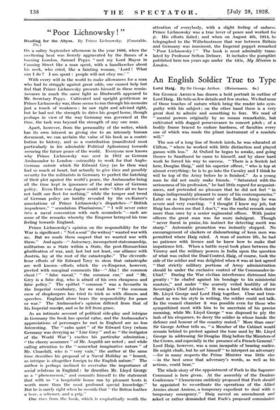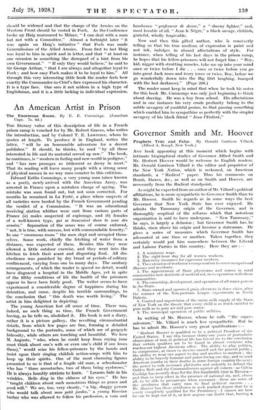An English Soldier True to Type
Lord Haig. By Sir George Arthur. (Heinemann. 6s.)
SIR GEORGE Alumna has drawn a bold portrait in outline of Lord Haig. He tells us few details and few stories. We find none of those touches of nature which bring the reader into sym- pathy with his subject ; on the other hand there is a very great deal to admire and something to fear. We read of " mental powers originally by no means remarkable, but cultivated with dogged perseverance to concert pitch ; of a bodily frame braced to endure hardness, of faculties every one of which was made the pliant instrument of a resolute will."
The son of a long line of Scotch lairds, he was educated at Clifton, " where he worked with little distinction and played games with less." At Oxford he began to awake, and going thence to Sandhurst he came to himself, and by sheer hard work he forced his way to success. " There is a Scotch lad here, Douglas Haig," said his superior officer, " who is top at almost everything ; he is to go into the Cavalry and I think he will be top of the Army before he is finished." As a young man he did not easily make friends. " Saturated with the seriousness of his profession," he had little regard for acquaint- ances, and pretended no pleasure that he did not feel " in things indispensably pleasant to many of his contemporaries." Later on as Inspector-General of the Indian Army he was severe and very exacting. " I thought I knew my job, but Haig has shown me that I don't," was the rueful remark made more than once by a senior regimental officer. With junior officers the great man was far more indulgent. Though " never fluent in praise, his instinct for detecting merit was sharp." Automatic promotion was instantly stopped. No encouragement of slackers or disheartening of keen men was permitted where Haig ruled. A man of austere life, he had no patience with licence and he' knew how to make that impatience felt. When a battle royal took place between the Viceroy and the military powers in India upon the question of what was called the Dual Control, Haig, of course, took the side of the soldier and was delighted when it was at last agreed " that strictly military portions of Army administration should be under the exclusive control of the Commander-in- Chief." During the War civilian interference distressed him greatly : " he chafed against his bondage to his ministerial masters," and under " the scarcely veiled hostility of his Sovereign's Chief Adviser." It was a hard fate which threw Mr. Lloyd George and Lord Haig together. Clear and tren- chant as was his style in writing, the soldier could not talk. In the council chamber it was possible even for those who sympathized most with him to be uncertain of his precise meaning, while Mr. Lloyd George " was disposed to ply the lash of his eloquence, to decry the soldier in whose hands the defence and honour of the country rested." More than once' Sir George Arthur tells us, " a Member of the Cabinet would remain behind to protest against the tone used by Mr. Lloyd George in addressing Sir Douglas Haig before the Ministers of the Crown, and especially in the presence of a French General." Lord Haig, however, was a man incapable of bearing malice. He might chafe, but he set himself " to interpret an adversary —for in many respects the Prime Minister was little else —in the best sense that adversary's words, as well as his actions, could bear."
The whole story of the appointment of Foch to the Supreme Command is here given. At the assembly of the Doulens Conference " Clemenceau suddenly proposed that Foch should be appointed to' co-ordinate the operations of the Allied Armies about Amiens, a temporary expedient to deal with a temporary eniergency." Haig moved an amendment and asked or rather demanded that Foch's proposed commission should be widened and that the charge of the Armies on the Western Front should be vested in Foch. As the Conference broke, up Haig murmured to Milner, " I can deal with a man but not with a Committee." Almost a fortnight later " it was again on Haig's initiative " that Foch was made Generalissimo of the Allied Armies. From first to last Haig was loyal to him in spirit and in letter, and that " at least on one occasion in something like disregard of a hint from his own Government." " If only they would believe," he said to Sir George Arthur, " that I am always and altogether loyal to Foch ; and how easy Foch makes it to be loyal to him." All through this very interesting little book the reader feels how exactly the Commander-in-Chief's face expressed his character. It is a type face. One sees it not seldom in a high type of Englishman, and it is a little lacking in individual expression.





































 Previous page
Previous page